Δ9-Tetrahydrocannabinol Disrupts Estrogen-Signaling Through Up-regulation of Estrogen Receptor β (ERβ).
Takeda S, Yoshida K, Nishimura H, Harada M, Okajima S, Miyoshi H, Okamoto Y, Amamoto T, Watanabe K, Omiecinski CJ, Aramaki H.
Abstract
Δ9-Tetrahydrocannabinol (Δ9-THC) has been reported as possessing anti-estrogenic activity, although the mechanisms underlying these effects are poorly delineated. In this study, we used the estrogen receptor α (ERα)-positive human breast cancer cell line, MCF-7, as an experimental model and show that Δ9-THC exposures markedly suppress 17β-estradiol (E2)- induced MCF-7 cell proliferation. We demonstrate that these effects result from Δ9-THC’s ability to inhibit E2-liganded ERα activation. Mechanistically, the data obtained from biochemical analyses revealed that: i) Δ9-THC up-regulates ERβ, a repressor of ERα, inhibiting the expression of E2/ERα-regulated genes that promote cell growth, and that ii) Δ9-THC induction of ERβ modulates E2/ERα signaling in the absence of direct interaction with the E2 ligand binding site. Therefore, the data presented support the concept that Δ9-THC’s anti-estrogenic activities are mediated by the ERβ disruption of E2/ERα signaling. αααααααααα


